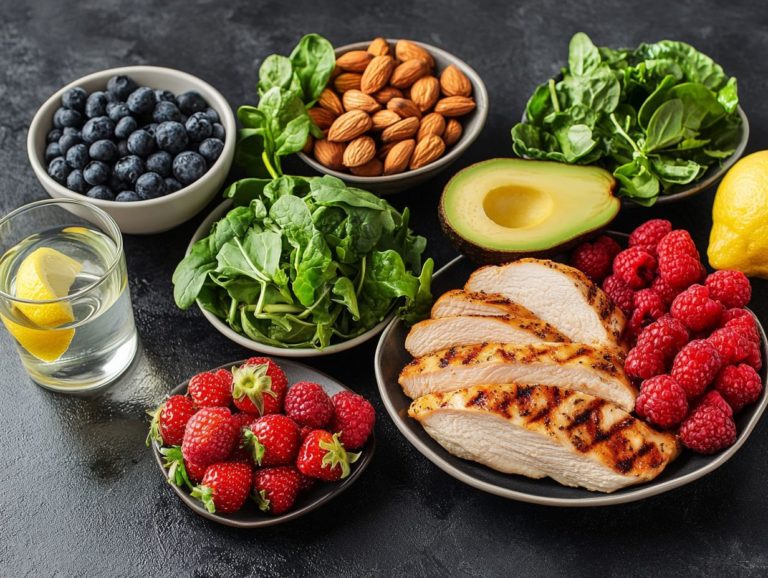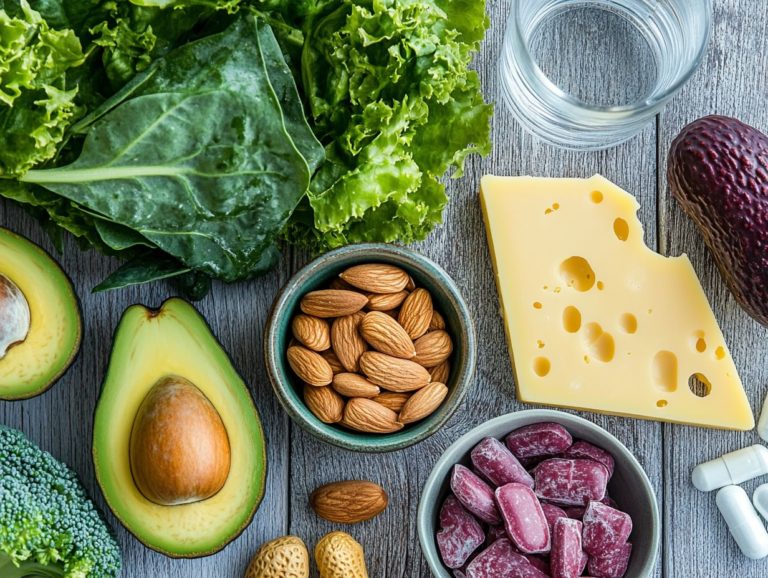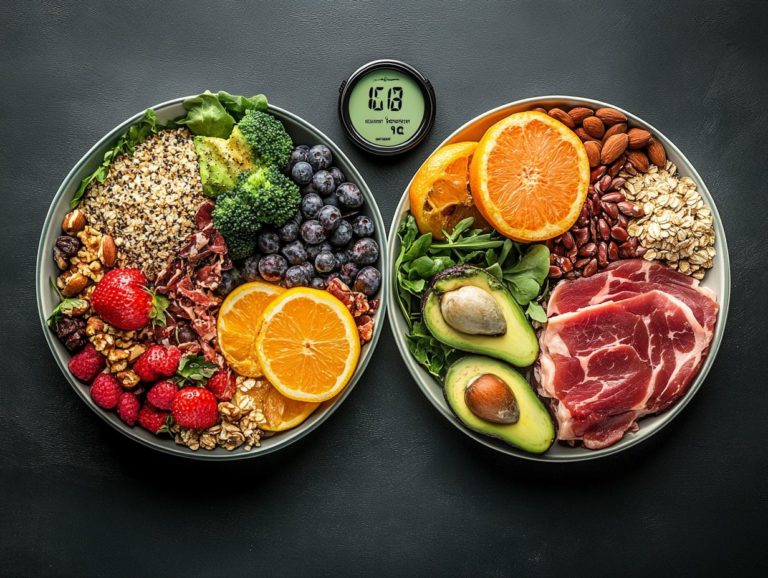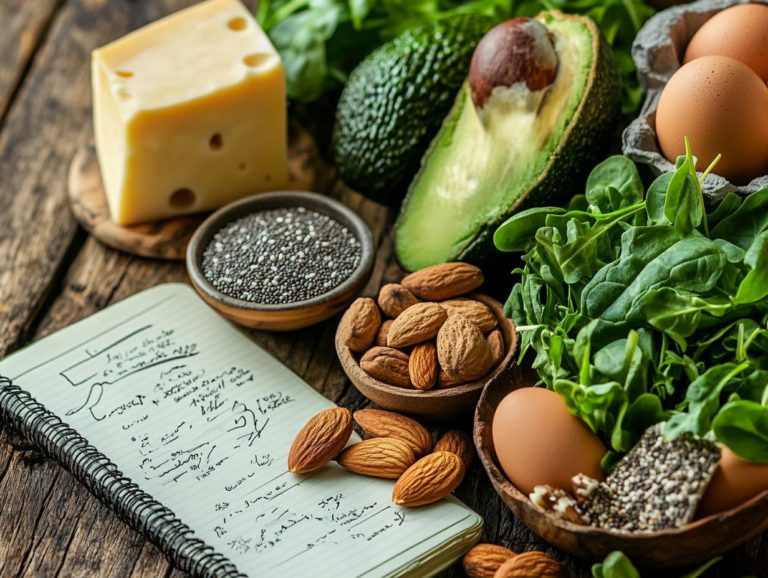The Importance of Nutrient Density
Understanding nutrient density is crucial for anyone aiming to elevate their health and well-being. Get ready to discover why nutrient density is your secret weapon for vibrant health! This article delves into the significance of nutrient density, revealing how it not only provides essential nutrients but also plays a vital role in reducing the risk of chronic diseases and addressing nutrient deficiencies. Don’t wait transform your diet today for a healthier tomorrow!
You ll find practical tips on enhancing nutrient density in your diet, emphasizing the importance of whole foods and healthy fats. Discover some of the most nutrient-dense foods you can seamlessly incorporate into your meals for a more balanced and vibrant lifestyle, supporting a healthy diet and good health.
Engage with this information to transform your perspective on nutrition and unlock your path to wellness.
Contents
- Key Takeaways:
- Why is Nutrient Density Important?
- How to Increase Nutrient Density in Your Diet?
- What Are the Most Nutrient-Rich Foods?
- Nutrient-Dense Foods
- Frequently Asked Questions
- How Does Nutrient Density Impact Our Health?
- What Are Some Examples of Nutrient-Dense Foods?
- How Can We Increase Nutrient Density in Our Diet?
- Is Nutrient Density Important for Weight Management?
Key Takeaways:
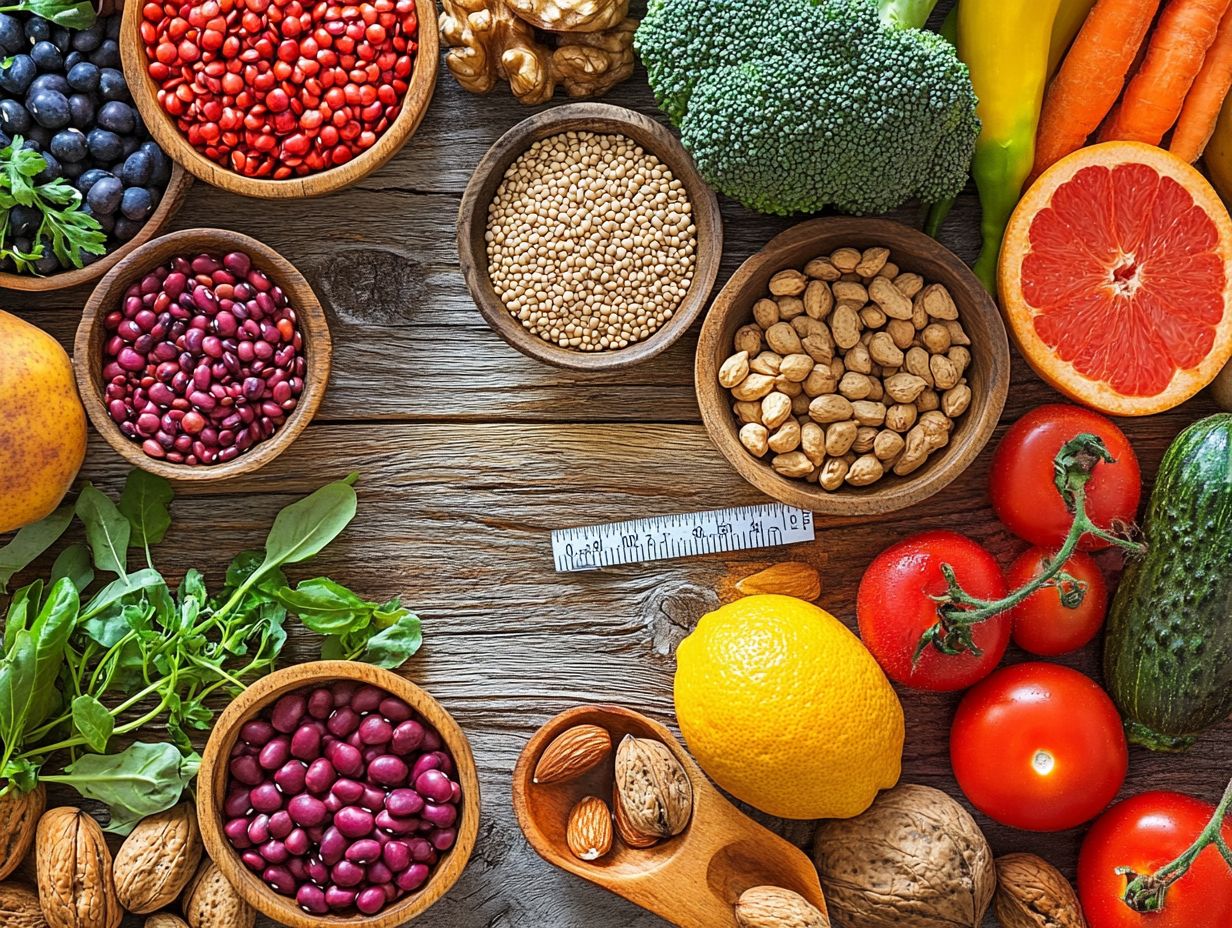
- Nutrient density is important for providing essential nutrients, supporting proper body functions, maintaining a healthy weight, reducing the risk of chronic diseases, and ensuring nutritional balance.
- Focus on whole, unprocessed foods, a variety of fruits and vegetables, lean proteins, whole grains, and healthy fats, while limiting added sugars and sodium to increase nutrient density in your diet, following dietary guidelines for optimal health.
- Some of the most nutrient-dense foods include leafy green vegetables, berries, salmon, eggs, nuts and seeds, avocados, whole grains, legumes, lean meats, dairy products, and other animal proteins.
Why is Nutrient Density Important?
Nutrient density is an essential concept in the world of nutrition, highlighting the amount of vital nutrients in a food compared to its calorie content. Essentially, it encourages you to choose nutrient-dense foods that offer high nutritional value without piling on the calories. This is particularly relevant when you consider today’s Standard American Diet, which often leans heavily toward high-calorie and processed options.
By prioritizing nutrient-rich choices, you can effectively combat nutrient deficiencies, promote optimal health, and significantly reduce your risk of chronic diseases like obesity, diabetes, and heart disease.
1. Provides Essential Nutrients
Nutrient-dense foods are essential for supplying your body with the vital vitamins and minerals it needs to function effectively. These nutrients are key players in supporting immunity, energy production, and overall cellular health, which is why it s crucial for you to incorporate a diverse range of food sources into your daily diet.
Think about it: fruits and vegetables brim with antioxidants, fiber, and phytonutrients. They not only boost nutrient absorption but also help lower inflammation and reduce the risk of chronic diseases. Whole grains serve up essential carbohydrates and B vitamins, while lean proteins deliver the important amino acids necessary for muscle repair and growth.
By ensuring you consume a variety of these food groups, you ll achieve a balanced nutrient profile that keeps deficiencies at bay, supports good health, and promotes your optimal health.
2. Supports Proper Body Functions and Nutrient Synergy
A diet rich in nutrient-dense foods is essential for supporting your body’s functions, as it provides the necessary vitamins, minerals, and macronutrients which include carbohydrates, proteins, and fats that fuel metabolism and energy production.
When you prioritize balanced meals that encompass a variety of food groups, you empower your body to thrive on optimal energy levels while maintaining a healthy weight. Carbohydrates act as your primary source of energy, while proteins are essential for muscle repair and immune function. Healthy fats play a crucial role in hormone regulation, nutrient absorption, and enhancing the bioavailability of nutrients.
By understanding the significance of energy density, you can make informed food choices. Opting for foods that deliver more nutrients per calorie not only enhances your overall health but also aids in effective weight management. A thoughtful combination of these macronutrients can significantly elevate your vitality and well-being.
3. Helps Maintain a Healthy Weight
Incorporating nutrient-dense foods into your diet is essential for maintaining a healthy weight, as it provides a sense of fullness without adding excessive calories.
This means choosing foods that are lower in calories yet rich in vitamins, minerals, and other vital nutrients. This allows you to satisfy your hunger while promoting overall health. For example, vegetables like spinach and broccoli, along with fruits such as berries and apples, are excellent options that deliver a nutritional punch without weighing you down calorically.
Using strategies like filling half your plate with these colorful choices can significantly elevate your health-focused selections. Adding whole grains, lean proteins, and healthy fats will help you feel fuller for longer. This makes it easier to manage portion sizes and resist less nutritious temptations. This approach also ensures that nutrients work together effectively and improve absorption.
4. Reduces Risk of Chronic Diseases
A diet rich in nutrient-dense foods significantly lowers your risk of chronic diseases by supplying health-promoting nutrients that fight inflammation and bolster your immune function.
Incorporating whole grains, fruits, vegetables, lean proteins, and healthy fats into your meals fosters optimal bodily functions, ensuring essential vitamins and minerals are always within reach. When you prioritize such dietary patterns, you ll likely experience enhanced energy levels, better nutrient absorption, and improved mental clarity, contributing to your overall well-being.
Avoiding highly processed foods and minimizing added sugars can further reduce your chances of developing serious health issues like heart disease, diabetes, and certain cancers. Emphasizing whole, nutrient-rich foods in your diet can significantly enhance your daily nutrient intake.
By choosing functional foods that nourish rather than hinder your health, you can build a strong defense against chronic conditions, paving the way for longevity and a richer quality of life. Thoughtful food preparation can also improve how well nutrients are absorbed by your body, ensuring you get the most out of your meals.
How to Increase Nutrient Density in Your Diet?
To elevate the nutrient density in your diet, you should make strategic food choices that favor whole, unprocessed foods instead of indulging in high-calorie, low-nutritional options. Incorporating both plant foods and animal foods can help achieve a balanced nutritional intake.
By prioritizing these wholesome selections, you can transform your health today by significantly enhancing the nutritional value of your meals and supporting your overall well-being.
1. Focus on Whole, Unprocessed Foods
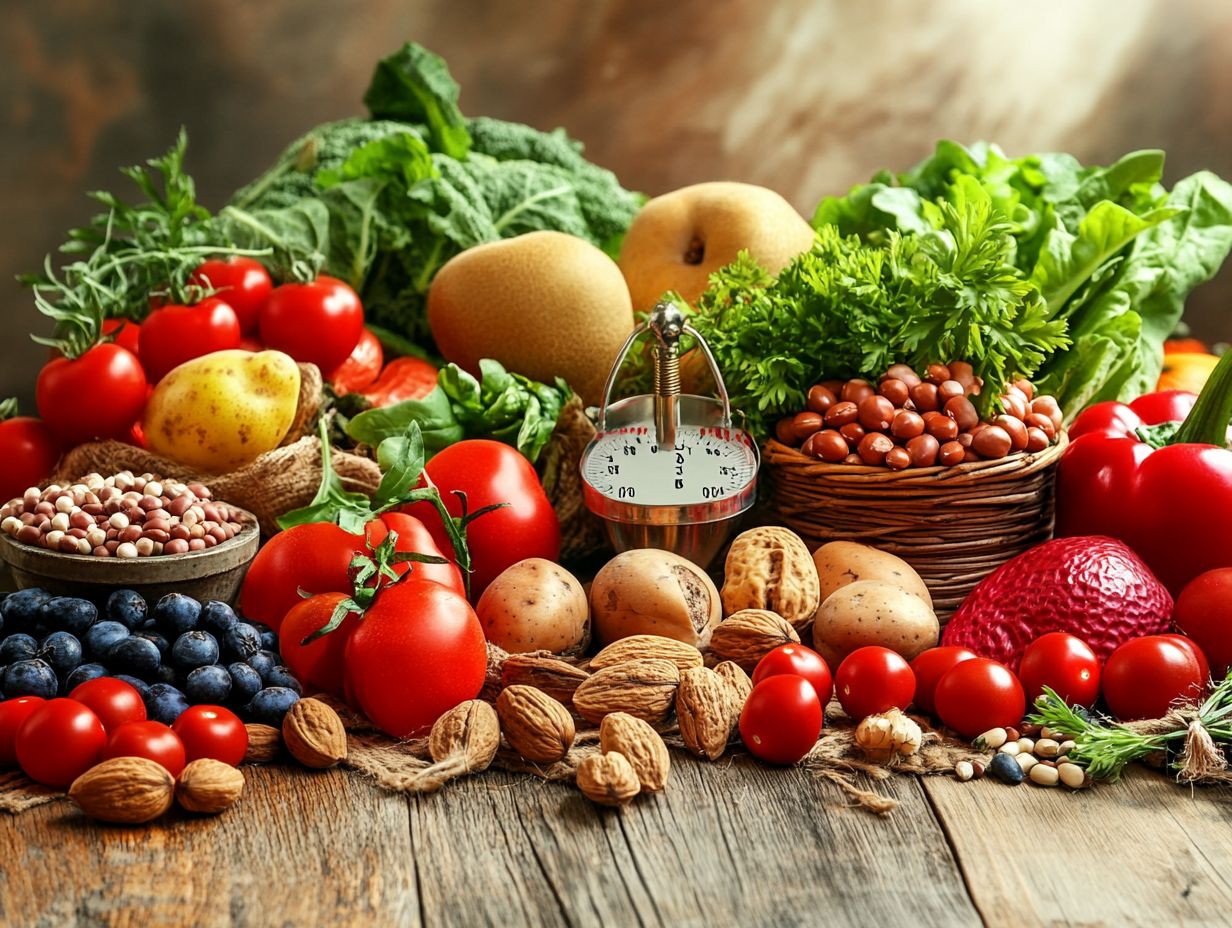
Focusing on whole, unprocessed foods is one of the most effective strategies for enhancing the nutrient density of your diet while minimizing the health risks that come with processed options, such as high-calorie foods with low nutritional value.
This approach opens the door to a delightful array of fruits and vegetables, all brimming with vitamins, minerals, and antioxidants essential for maintaining your overall health. Whole grains contribute vital fiber to support your digestive health, while lean proteins supply the necessary amino acids for muscle repair and growth.
Unlike processed foods, which often come laden with additives, preservatives, and excessive sugars, these whole foods promote your well-being by providing nutrients in their purest forms. By making these foods a priority, you can elevate your dietary quality, enhance the nutrient composition of your meals, and potentially lower the risk of chronic diseases associated with poor eating habits.
2. Incorporate a Variety of Fruits and Vegetables
Incorporating a variety of fruits and vegetables into your meals does more than simply enhance nutrient density. It ensures you enjoy a diverse intake of vitamins and minerals.
This variety is essential for maximizing nutrient absorption, as different produce provides unique benefits that collectively bolster your overall health.
Take seasonal fruits, for instance. Pumpkins and apples in the fall or berries and tomatoes during summer are packed with antioxidants and essential nutrients.
To seamlessly weave these into your daily meals, think about adding roasted seasonal vegetables to your stir-fries or crafting vibrant salads with a mix of greens.
You can also blend fruits into refreshing smoothies. With a thoughtful approach to including diverse produce, you’ll find it much easier to prevent nutrient deficiencies while supporting your skin health, digestion, and immune function.
This variety helps maintain a proper nutrient composition in your diet.
3. Choose Lean Proteins
Selecting lean proteins, such as poultry, fish, legumes, and low-fat dairy products, can greatly enhance your nutrient intake while keeping saturated fat levels in check.
Lean protein sources delightfully offer fewer calories while boosting your health! They are essential for maintaining muscle mass, which is crucial for your overall health and metabolism.
By incorporating a variety of lean proteins into your meals, you ensure that you re getting an adequate supply of essential amino acids necessary for tissue repair and growth.
Lean proteins like fish are rich in omega-3 fatty acids that promote heart health. Legumes provide fiber that supports digestion and helps you feel full.
Moderating the consumption of saturated fat from these sources ensures a healthier diet. By embracing dietary recommendations that highlight these protein-rich foods, you can create a balanced diet that fosters both physical well-being and nutritional adequacy.
4. Opt for Whole Grains
Opting for whole grains instead of refined grains is a pivotal move to enhance your nutrient intake. Whole grains are brimming with complex carbohydrates, fiber, and essential nutrients.
These grains contribute to better nutrient profiling and help reduce the risk of micronutrient deficiencies.
Grains like oats, brown rice, and quinoa not only provide you with sustained energy but also play a crucial role in supporting your digestive health.
Their high fiber content works wonders by regulating bowel movements, promoting gut health, and even lowering the risk of digestive disorders.
By weaving whole grains into your daily meals, you contribute to a balanced diet that elevates your overall nutritional value and nutrient density.
Don’t miss out on the incredible benefits of whole grains! They are incredibly versatile and can be seamlessly incorporated into a variety of dishes.
When you prioritize whole grains, you are not just supporting your energy levels; you are also reaping a wealth of health benefits and essential nutrients.
5. Include Healthy Fats
Incorporating healthy fats like those delightful ones from avocados, nuts, and olive oil into your diet is essential for optimal nutrient absorption and overall wellness.
These unsaturated fats are key players in helping you absorb fat-soluble vitamins such as A, D, E, and K, which are critical for a range of bodily functions.
When your body effectively absorbs these nutrients, they work together to boost your immune system, promote radiant skin, and support strong bones.
Take olive oil, for example: it enhances the flavour of your meals and aids in absorbing antioxidants found in vegetables.
Walnuts and flaxseeds, which are rich in omega-3 fatty acids, help reduce inflammation and provide protection against chronic diseases.
By prioritizing unsaturated fats in your diet, you can prevent nutrient deficiencies and maintain a well-rounded nutritional profile.
6. Limit Added Sugars and Sodium
Limiting added sugars, saturated fat, and sodium in your diet is crucial for maintaining nutrient density, which is the amount of nutrients packed into a food item relative to its calorie content. Excessive intake can lead to health risks and nutrient deficiencies that you simply want to avoid.
Consuming high levels of added sugars can contribute to weight gain, elevate blood sugar levels, and increase your risk of chronic diseases like diabetes and heart disease. Similarly, too much sodium is often linked to hypertension and various cardiovascular issues, disrupting your body’s natural balance.
To deal with these issues, make it a fun habit to read food labels with a discerning eye, seeking out products that contain fewer than 5 grams of added sugar per serving and less than 140 milligrams of sodium. When preparing your meals, embrace whole foods like fruits, vegetables, lean proteins, and whole grains. This approach not only reduces your sodium and sugar intake but also enhances your overall health.
What Are the Most Nutrient-Rich Foods?
You ll find that some of the most nutrient-rich foods available are leafy green vegetables, berries, salmon, and legumes. These options pack a powerful nutritional punch while keeping calories in check, making them ideal choices for a healthy diet.
1. Leafy Green Vegetables
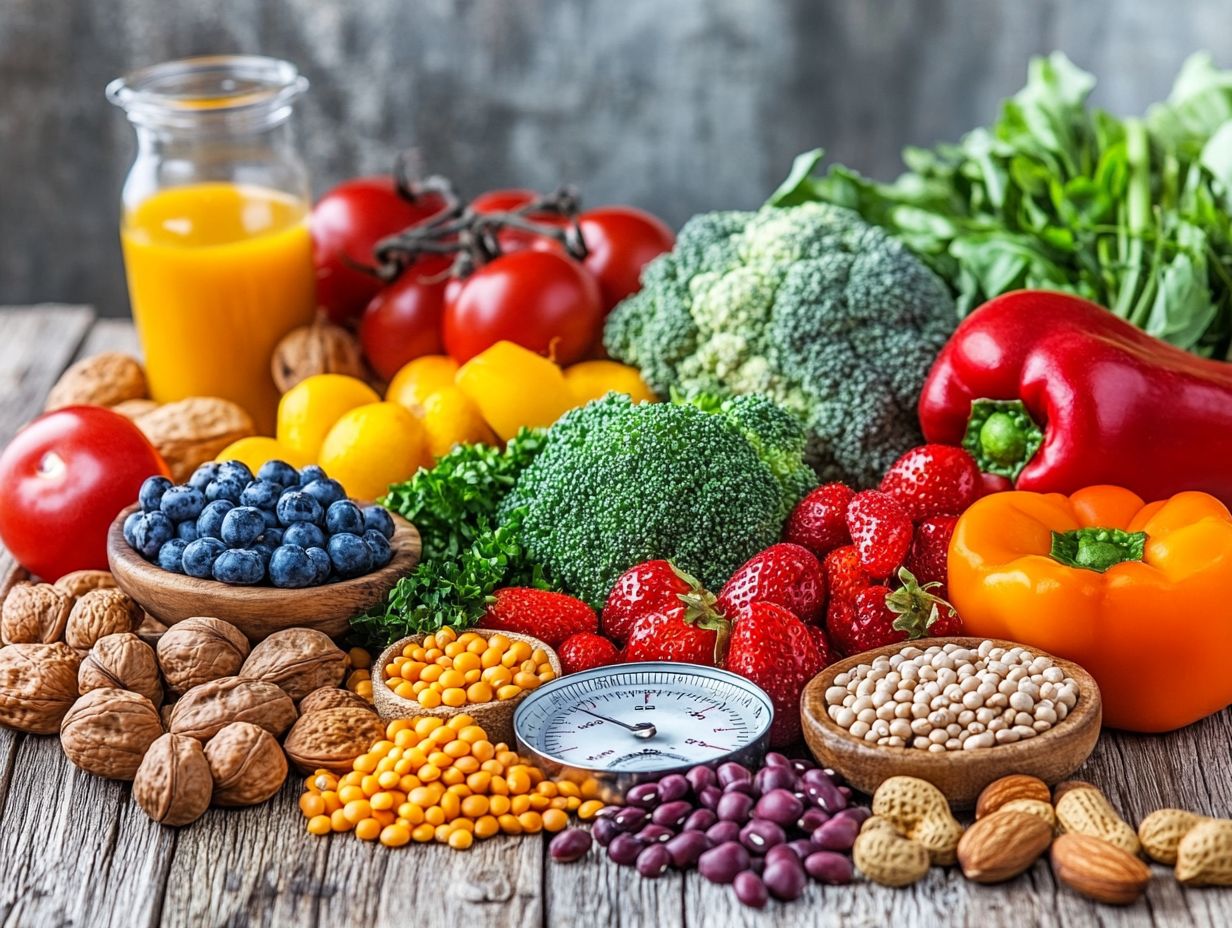
Leafy green vegetables, such as spinach, kale, and Swiss chard, are truly remarkable for their impressive nutrient density. They are brimming with essential nutrients like vitamins, minerals, and antioxidants.
These vibrant greens are particularly abundant in vitamin K, which is crucial for maintaining strong bones and plays a vital role in blood clotting and overall health. They also provide vitamin A, which supports healthy vision and immune function, as well as vitamin C, which contributes to skin health and enhances your body s ability to absorb iron from plant sources.
Incorporating these vegetables into your balanced diet is a breeze. You can savor them fresh in salads, saut them with garlic for a quick and delightful side dish, or blend them into smoothies for a nutrient-rich breakfast. These rich sources of micronutrients are a crucial part of a healthy diet.
Their versatility encourages endless culinary creativity, making it effortless for you to elevate your overall nutritional intake.
2. Berries
Berries, particularly blueberries, strawberries, and raspberries, are nutrient-dense fruits renowned for their rich antioxidant content and impressive vitamin levels. Their low-calorie nature makes them a preferred choice over high-calorie foods.
These vibrant fruits not only deliver essential nutrients but also play a pivotal role in enhancing your overall health. They’re particularly celebrated for their capacity to reduce inflammation and support heart health, owing to their abundant flavonoids and other beneficial compounds.
Incorporating a variety of berries into your daily meals is both simple and delightful. Imagine adding them to your breakfast cereals or smoothies, tossing them into salads, or savoring them as a refreshing snack all on their own. Their natural sweetness makes them an excellent choice for desserts as well, providing a healthier alternative to processed sugars without sacrificing flavor.
3. Salmon
Salmon stands out as a nutrient-dense marvel that delivers essential omega-3 fatty acids, high-quality protein, and a wealth of vitamins and minerals. This impressive combination positions it as an excellent ally in enhancing heart health and supporting optimal brain function.
By incorporating salmon into your diet regularly, you may significantly reduce the risk of heart disease thanks to its ability to lower blood pressure and improve cholesterol levels. It’s an amazing example of a food with high nutritional value.
The omega-3 fatty acids present in this fish are renowned for boosting cognitive function and may even help ward off age-related decline. Always choose wild-caught varieties for the best health benefits! For preparation, consider grilling, baking, or poaching; these methods not only preserve its delectable flavor and health benefits but also ensure your meals remain light and nutritious.
4. Eggs
Eggs rank among the most nutritious foods available, providing a complete source of protein along with essential nutrients like choline and B vitamins. They epitomize the nutrition of animal foods.
This remarkable nutrient profile makes them a staple in diets across the globe. They’re not just packed with high-quality protein, vital for muscle repair and growth; they re also loaded with important vitamins and minerals that contribute to overall health.
The culinary versatility of eggs is truly unparalleled. From breakfast favorites like scrambled or poached eggs to elegant dinner dishes such as frittatas and quiches, you can seamlessly incorporate eggs into a wide array of meals.
By adding these nutrient-dense foods to your diet, you can effortlessly elevate your nutritional intake while indulging in a diverse range of delicious options.
5. Nuts and Seeds
Nuts and seeds serve as exceptional sources of healthy fats, protein, and an array of essential nutrients, making them the perfect choice for nutrient-dense snacks. Nuts and seeds are crucial in dietary guidelines.
Not only do they offer a satisfying crunch, but they also come in a delightful variety of flavors and textures that can elevate any dish.
Take almonds, for instance; they are rich in vitamin E, which promotes skin health. Meanwhile, walnuts boast an impressive amount of omega-3 fatty acids, supporting heart health.
Chia seeds, on the other hand, act as a powerhouse of fiber and can easily be blended into smoothies or yogurt to add thickness and nutrition.
By incorporating a diverse mix of these options into your daily meals, you can savor both the taste and health benefits, transforming simple dishes into nutrient-packed delights.
6. Avocados
Avocados are a remarkable fruit that offers healthy fats, fiber, and an impressive array of vitamins and minerals, significantly enhancing their nutritional value.
These qualities make avocados a fantastic addition to your balanced diet. They promote heart health by lowering bad cholesterol levels and assist with weight management thanks to their satisfying nature.
Incorporating avocados into your meals can be both delightful and versatile. You might blend them into smoothies, spread them on toast, or toss them into salads for that creamy texture.
They truly shine in dishes like guacamole or as a topping for enticing tacos, allowing you to relish their health benefits while indulging in rich culinary experiences.
7. Whole Grains
Whole grains, like quinoa, brown rice, and oats, are not just staples; they are essential to a nutrient-dense diet packed with complex carbohydrates and fiber. These plant foods are powerhouses for your health!
These remarkable foods offer sustained energy, ensuring you remain full and satisfied throughout your day. They provide a steady source of energy density while also maintaining low-calorie benefits.
Their impressive fiber content plays a crucial role in supporting your digestive health by promoting regularity and nurturing a healthy gut microbiome.
To effortlessly weave whole grains into your daily meals, consider making some simple swaps:
- Replace white rice with brown rice in your favorite stir-fries.
- Opt for whole grain bread when crafting your sandwiches.
For those who love breakfast, oats can easily be added to smoothies or transformed into overnight oats for a quick and nutritious morning boost. By embracing a variety of whole grains in your diet, you’ll not only elevate your meals but also enhance your overall well-being.
Nutrient-Dense Foods
8. Legumes

Legumes, such as beans, lentils, and chickpeas, are nutrient powerhouses that offer an exceptional source of plant-based protein, dietary fiber, and complex carbohydrates. Including these in your diet contributes to a nutrient-rich and healthy diet.
These versatile ingredients elevate many dishes, from hearty stews to vibrant salads. Their unique ability to absorb flavors makes them a beloved choice in global cuisines.
Incorporating legumes into your diet not only enhances your meals with essential vitamins and minerals but also promotes better digestive health and supports healthy weight management. Ultimately, adding legumes to your daily meals paves the way for a more balanced and nutritious eating pattern.
9. Lean Meats
Lean meats, such as turkey and chicken breast, serve as outstanding sources of high-quality lean protein and essential vitamins. These animal proteins are key components in achieving balanced nutrition and good health.
By incorporating these protein-rich options into your daily meals, you can significantly enhance muscle maintenance, especially if you engage in regular physical activity. They provide the necessary amino acids for muscle repair and growth.
Try grilling, baking, or stir-frying for delicious meals! Marinating in herbs and spices can elevate taste and promote healthier cooking methods.
10. Dairy Products
Dairy products, like yogurt and cheese, serve as an excellent source of calcium and protein. These animal foods also provide essential fatty acids and vitamins necessary for good health.
- Provides calcium and protein.
- Supports strong bones.
- Helps prevent osteoporosis.
When selecting dairy options, consider opting for lower-fat varieties, such as skim milk or low-fat yogurt. Integrating these dairy products into your meals is remarkably easy; they can be blended into smoothies, incorporated into various dishes, or savored as snacks.
Frequently Asked Questions
What is Nutrient Density?
Nutrient density refers to the amount of essential nutrients, such as vitamins, minerals, and fiber, in a given amount of food.
Why is Nutrient Density important?
Nutrient density is important because it determines the overall nutritional value of a food. Foods high in calories with low nutrient density can lead to nutritional deficiencies and chronic disease.
How Does Nutrient Density Impact Our Health?
Nutrient density is crucial for our health. It supplies the essential nutrients our bodies need to function properly.
A diet rich in nutrient-dense foods can prevent nutritional deficiencies and lower the risk of chronic diseases. Understanding how nutrients work together can enhance absorption and usage of these vital components.
What Are Some Examples of Nutrient-Dense Foods?
Fruits, vegetables, whole grains, lean proteins, and healthy fats are nutrient-dense options. These foods provide essential nutrients and numerous health benefits.
Incorporating these food groups into your diet helps achieve nutritional balance and reduces health risks.
How Can We Increase Nutrient Density in Our Diet?
Focus on adding whole, unprocessed foods like fruits, vegetables, and lean proteins to your meals. Avoid highly processed items that are often low in nutrients and high in calories.
Choosing foods with high nutrient content over those with high energy density can improve your daily intake of health-promoting nutrients significantly.
Is Nutrient Density Important for Weight Management?
Yes, nutrient density plays a vital role in weight management. Foods high in nutrient density are usually lower in calories and provide more satiety.
This makes it easier to maintain a healthy weight and reduce the risk of overeating. Choosing low-calorie, nutrient-rich foods supports dietary guidelines for optimal health.

